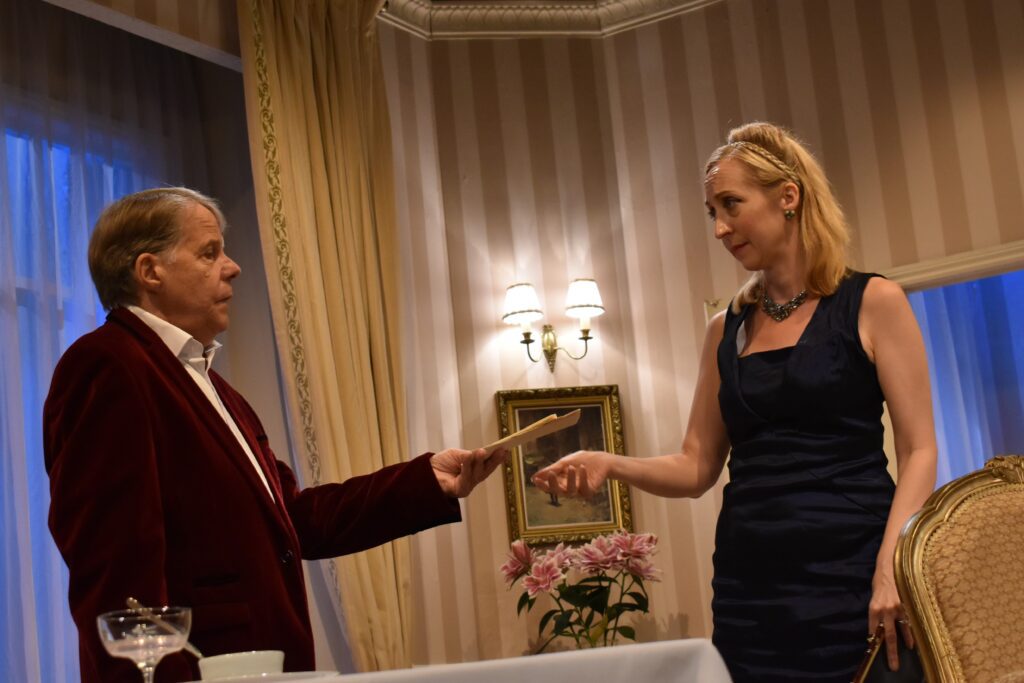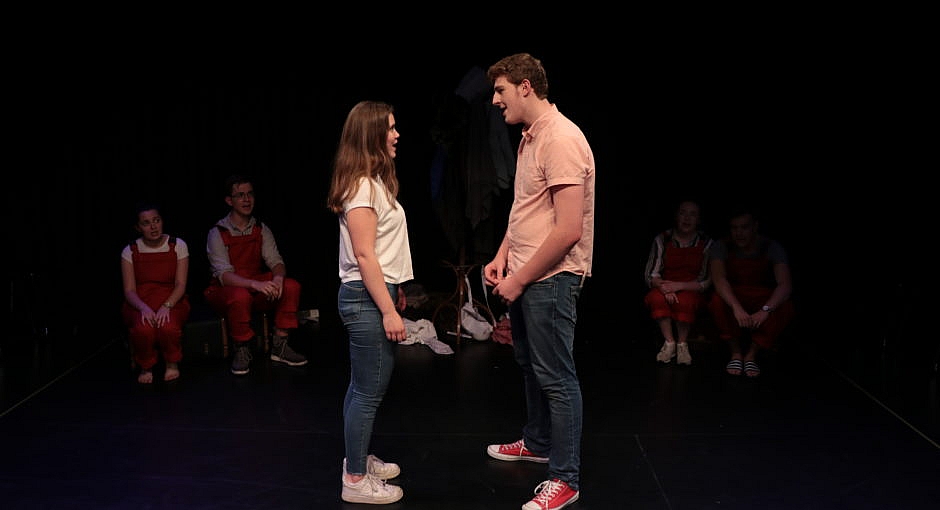______
1 September 2025
______
5*****
______
Written as part of a trilogy all set in the same suite of a luxury Swiss hotel, ‘A Song at Twilight’ is one of Noel Coward’s final plays and tells of renown writer Sir Hugo Latymer coming face to face with his past lives and loves, which may devastate his reputation. As he is visited by a former lover (Carlotta Gray), what appears to be a case of blackmail, over some letters which would expose his homosexuality, is actually a comeuppance for his behaviour and treatment of people who have held him dear. It is a brilliant play with the, often, uncomfortable storyline, pitted with vicious barbs and insults. It is also unbearably moving.
For much of the piece the audience will only feel antipathy towards Carlotta as she bullies Hugo about their past and about using his love letters to her in her autobiography; it is left for the final lines of the first act, in a real ‘coup de theatre’, that you side even more with Hugo – its devastating. As the second act reveals the reasons for Carlotta’s actions, there is a softening towards her – she is redressing a balance, saying things that Hugo doesn’t want to hear because it will affect his name and reputation. All the while Hugo’s German wife Hilde is the one who really knows what is going on; the one who has risen above her husband’s secrets and behaviour – “Why are you so loyal to him?” asks Carlotta of Hilde, who responds, “Because he is all I have.” Quietly it hits you in the solar plexus.
As challenging a play as there is in so many ways. A cast of four characters, no bells and whistles, no special effects, no rough and tumble – it is all in the words and in the gradual unwrapping of the many-layered story. There is nowhere to hide and the actors are presented with many hurdles along the way. The play may be sixty years old, but so many aspects of the story have been played out in the news and on social media in more recent times that it feels incredibly fresh and relevant.
Firstly, if there is a more elegant set on any stage at the moment, then I would be surprised – Sidmouth audiences have been treated to wonderful creations from Andrew Beckett and his team this year – Rhys Cannon and James Prendergast should get a curtain call after each show – this is sublime.
I have reviewed James Pellow well over 20 times – this is the best performance I have seen him give. The gradual effects of the battering he receives is displayed by the physical crumpling of a man who is facing his private past which he knows is not glorious. Pellow displays the complexities of Hugo masterfully, from arrogance to anger, from bitterness to emotional trauma; the ending of the play breaks your heart. It is a magnificent performance of a huge role which, despite Coward referencing William Somerset Maugham, must really have substantially been autobiographical.
Claire Louise Amias likewise gives a towering performance. Incredibly elegant in a sleek long dress, Carlotta gradually dismantles Hugo and Amias brings a surgical precision to the process, but her softening towards the end is real and heartfelt. These two actors have the lion’s share of the play and watching their verbal jousting is a great privilege.
As Hilde, Stephanie Willson, is an utter gem; behind the outward chirpiness and almost carefree attitude is a character full of love and care, who has suffered greatly in the past and doesn’t want to again; her revelations in the latter stages of the play are stunningly delivered and as the light relief she provides develops into great depth of feelings, you cannot but love the character.
In the tiny role of the waiter, Felix, Charlie Bryant is efficient and respectful but you always have the feeling that he knows plenty about what is happening.
This is a perfectly cast play and performed with great skill and understanding. Anton Tweedale directs with enormous skill and insight. It is a great director who will let the script do the work while gently delving into the subtext and letting the two combine simply and without fuss. The hands of a director should never be seen over a piece such as this, it will ruin it, what you want is a subtlety, a moulding, a knowledge brought to the surface. Tweedale does all this and let’s Coward’s work stand out. It is peerless work.
It is always unbelievable to see what can be achieved in just five days rehearsal but when you reach these levels of performance it is even more to be admired. A beautiful and, in my estimation, an important play which is given a production of real class and excellence.
Cast
Hilde Latymer – Stephanie Willson
Felix – Charlie Bryant
Hugo Latymer – James Pellow
Carlotta Gray – Claire Louise Amias
Creatives
Writer – Noel Coward
Director – Anton Tweedale
Set Design – Andrew Beckett
Costume Designer – Jan Huckle
Lighting Design – Chris Jackson, Will Tippet,
Sound Design – James Prendergast
Set Builder – Rhys Cannon
Stage Manager – James Prendergast
Set Assistant – Dominic McChesney
Artistic Director – Paul Taylor-Mills
Associate Producer – Andrew Beckett



